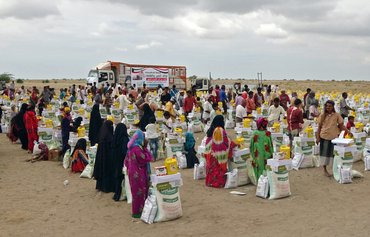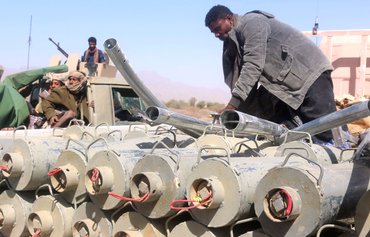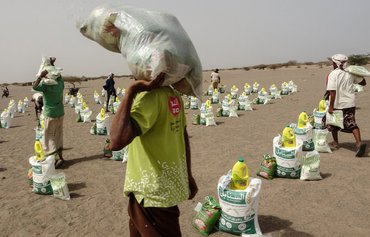ADEN -- The Yemeni government is pursuing a number of initiatives aimed at preventing the years-long strategy of the Houthis (Ansarallah) to divert much-needed international food aid to their own fighters, or selling it to fund their war effort.
The Iran-backed group has taken advantage of the fact that the main offices of international relief organisations are located in Sanaa to interfere in the aid distribution process throughout Yemen.
After six years of a war that began when the Houthis staged a coup and seized control of the capital city, the Yemeni people are facing the devastating consequences -- including widespread hunger and displacement.
The war has battered the economy and left the healthcare system in ruins, even as the coronavirus pandemic ravages the country, leading to a situation the United Nations describes as the world's worst humanitarian crisis.
![Displaced Yemenis receive humanitarian aid provided by the World Food Programme in the Khokha district of al-Hodeidah, on March 29. [Khaled Ziad/AFP]](/cnmi_am/images/2021/04/06/29257-yemen-aid-hodeidah-600_384.jpg)
Displaced Yemenis receive humanitarian aid provided by the World Food Programme in the Khokha district of al-Hodeidah, on March 29. [Khaled Ziad/AFP]
The Yemeni people are in desperate need of aid. But the Houthis continue to obstruct international efforts to provide them with humanitarian relief.
The Houthis have been diverting much-needed food aid to their own fighters, or selling it to fund their war effort, according to Deputy Minister of Human Rights Nabil Abdul Hafeez.
He pointed to the control the Houthis exercise over the work of international humanitarian organisations, whose main offices are located in Sanaa.
Sanaa, which the Houthis have controlled since their coup of 2014, serves as a key distribution point of relief aid destined for the populations of Houthi-controlled provinces.
De-centralising relief work in Sanaa
Yemen's legitimate government has requested that relief organisations move their main offices to the provisional capital of Aden, Abdul Hafeez said, but while some have opened branches in the southern city, "others continue to stall".
The government has formed a committee comprised of representatives of seven government agencies, which has been tasked with facilitating the work of these organisations and enabling them to reach the intended beneficiaries, he said.
The government also plans to establish relief centres in five provinces to eliminate the centralisation of relief work in Sanaa, and put an end to the Houthis' control over these organisations, he added.
The UN Office for the Co-ordination of Humanitarian Affairs (OCHA Yemen) has established a relief centre in Marib, which is facing a difficult humanitarian situation and burgeoning population of internally displaced persons (IDPs).
UN resident co-ordinator in Yemen David Gressley visited Marib province on March 22, touring the displacement camps to get a firsthand picture of the humanitarian situation.
In a brief statement, the OCHA Yemen office said Gressley's visit marked the official start of humanitarian flights to Marib.
"The organisation now has a relief centre in Marib and continues to carry out its relief work in other provinces through its branch office in Aden," OCHA Yemen spokesman Zaid al-Alaya told Al-Mashareq.
OCHA Yemen distributes this aid to neighbouring provinces, he said, while a branch in Ibb province distributes aid in the provinces of Ibb and Taez.
Misdirecting humanitarian aid
The five relief centres the government is trying to establish in the provinces it controls will "enable all organisations to operate through them in delivering aid to the needy, free of Houthi control", said economist Abdul Aziz Thabet.
"The Houthis imposed many conditions on the organisations and their operations, directly and by pressuring them to employ personnel affiliated with it," Thabet said.
He noted that many partner non-governmental organisations that are helping the relief organisations distribute aid are affiliated with the Houthis.
Meanwhile, he said, the Houthis have banned NGOs that are not affiliated with it from operating in areas under their control.
These efforts are part of an attempt to manipulate the distribution of aid to direct it in a way that serves the Houthis' agenda, said Studies and Economic Media Centre chairman Mustafa Nasr.
The aid has become one of the tools the group uses to recruit new fighters and gain favour with its supporters, he said.
Relief organisations operating in the field can no longer start their distribution operations without first submitting full lists of recipients to the Houthis, he said, who thereby decide who is omitted or added to the lists.
A large portion of this aid goes to influential members of the militia in the areas it controls, according to testimonies from civil society organisations operating on the ground, Nasr said.
Long delays in approving aid projects, obstruction of aid surveys, and efforts to dictate allocation, alongside violence towards aid workers, have all frustrated the flow of essentials in Yemen, HRW said in September.

![Displaced Yemenis receive humanitarian aid provided by the World Food Programme in the northern province of Hajjah, on January 12. The Houthis have been tampering with aid and preventing its distribution to intended beneficiaries. [Essa Ahmed/AFP]](/cnmi_am/images/2021/04/06/29258-yemen-aid-hajjah-600_384.jpg)







Gabran Abd Saleh. I'm from Yemen. [unintelligible]
Reply1 Comment(s)